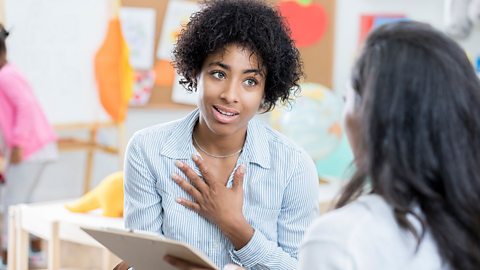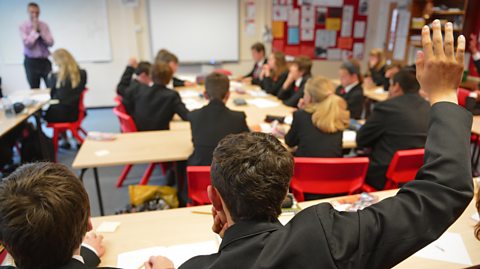
Teachers and school staff had to navigate disruption to education like never before in 2020, but through the restrictions and adaptions many have found new ways of teaching and connecting with children.
The Covid-19 pandemic has necessitated radical changes in schools, some unwelcome, some of which could bring about lasting benefits.
Four teachers explain what they have learnt from rising to the challenges of the pandemic, and how this could inform their work in future.
(Non) Physical Education
For Zak, the head of drama at a north Warwickshire secondary school, social distancing guidelines meant rethinking the setup of his lessons.
Zak described some of the positives that came from this: "For Drama, students sit down in squares in groups of six.
"This has been good for allowing them to appreciate the large space more in rehearsal and to follow routines better.
"I have had many students self-isolating and this has helped me to focus on the other aspects of drama and theatre that I don’t always give my attention to, such as creating set designs and costumes, rather than just performing."

Functioning without feedback
With restrictions on coming into contact with pupils’ work, teachers have had to reconsider their approach for marking and feedback.
Toby, an art teacher and Year 11 form tutor at a secondary school in East Sussex, explained this has broadened his appreciation for different teaching methods.
"Like everyone who had to teach online, you learn the importance of physically being there.
"What’s been lost specifically to art teaching is proximity, and the haptic aspect of art.”
Toby can no longer make notes in his pupils’ sketchbooks, for instance, or add to their drawings and paintings.
"You think the most important aspect of teaching is verbal, but it’s made me realise all the other elements of it are so fundamental when they’re removed," he said.
There have been some surprising benefits to the more ‘hands off’ approach though, as Grace, a Year 6 teacher at a Liverpool primary school, has discovered.
"I have found that social distancing has forced me not to ‘go running to help anyone with their hand up'," she said.
"I stand at the front and pupils have to explain what they are struggling with.
"Often, they solve their own problem by just speaking through their difficulty."
Grace has discovered that many children have learnt how independent they can be.
"I used to spend the majority of my lessons sat next to children who were struggling," she explained.
"In hindsight, this probably hindered their progression, as they became reliant on my support."
The perception in some of the press is that teachers have had an easy ride.
Challenging the status quo
The disruption of established educational practices has resulted in teachers questioning the systems within which they work.
Witnessing the children’s development despite the more limited feedback available has led to changing attitudes throughout Grace’s school.
"Children don’t need me to write a paragraph of feedback after every piece of work," she said.
"They still progress without me writing anything.
"Senior leadership have learnt that the world does not fall apart without marking."
Not only this, but without lesson observations taking place, Grace says she feels far more trusted and appreciated than before.
Toby wonders whether there will be a more widespread attitude shift in the education sector as a result of the cancelled SATs, GCSEs and A-levels.
"Once you reach that tipping point where you have Centre Assessed Grades and replace formative assessments, I think it’s natural that you start questioning the purpose, efficacy and rationale behind the crazy level of examining we do in this country."
Social distancing has forced me not to ‘go running to help anyone with their hand up'
Learning from lockdown
The first lockdown brought with it a massive educational upheaval. What can teachers take forward from this experience?
Abi, a preschool teacher at a primary school in Cheshire, said that during the early days of lockdown, "Mixed age teaching in the key worker groups had some positives.
"Children from pre-school to Year 6 working cooperatively together on craft activities, for example, wouldn’t usually happen in our school."
This is something she hopes will continue through after school art clubs with mixed age groups.
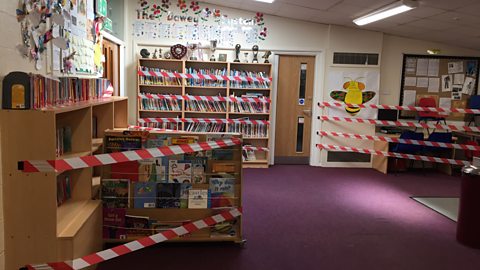
Zak also found that lockdown led to some professional benefits, "I was able to attend so many CPDs (Continuing Professional Development) via Zoom.
"I was able to do drama workshops, listen to more drama lectures than before and connect and collaborate with so many other drama teachers."
Pet therapy
Grace and Toby both discovered the positive impact that a show-and-tell type scenario can have, even with older pupils.
Grace gave her Year 6 class opportunities to share things with the class for the first time. "I think we have been guilty in the past of assuming they are quite old, when they are only 10 or 11," she said.
"Even at 26-years-old I like to see photographs of pets, so I must remember that they do too!"
The inclusion of four-legged friends also helped Toby to keep his class engaged when he was teaching via a video link.
"When you’re speaking into the void, you can’t really have any meaningful interaction," he said.
"Although you can get them to hold up their pets, which is a good way to improve someone’s day.
"For me it was a massive morale booster to meet lots of dogs and cats."

Glad to be back
If there’s something children have learnt from a gap away from education, it’s how much they value school life.
Grace found that, like herself, most of her pupils were "absolutely desperate" to return to school.
She said that "just being in school and in a normal routine has benefitted them more than anything."
When it became apparent that Liverpool would be placed in tier three, Grace prepared herself to assuage her pupils’ fears about its impact on their life outside school.
She was surprised, then, to discover "their biggest concern was not being able to come into school."
Toby was similarly heartened by his pupils’ enthusiasm for school life.
"When my tutor group came back after the summer, there was a sense of relief and joy in a way that teenagers, even the keenest ones, don’t usually approach school," he said.
"There was an acknowledgment of this very special atmosphere that they’re a part of.
"That felt really good."
Wellbeing
With the focus moving away from exams and academia, physical and emotional health have become a paramount concern.
At Abi’s school, there was a whole school recovery programme which involved workshops to help the children cope with anxiety, stress, grief, and trauma after lockdown.
As well as Mental Health Week in February, they will also continue with stand alone weeks throughout the year to focus on emotional support.
This extends to her Early Years Foundation Stage children, who are learning about emotional health and managing emotions through puppets and stories.
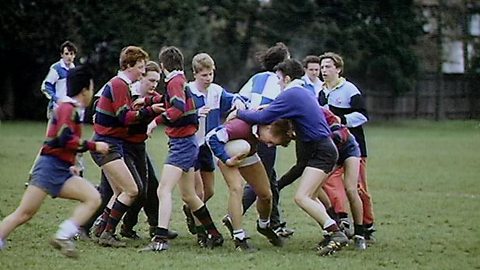
Team Spirit
For all the teachers we spoke to, a word that continually comes up in relation to their pupils is ‘resilience’.
Abi notes that at her school, staff wellbeing has been improved by "the cancellation of unnecessary and typically time-consuming staff meetings."
But she has had to take extra measures to maintain her mental health, too. "I paid privately to see a mental health professional to help me manage my own stress levels and Long Covid recovery," she said.
She predicts that as many as 90% of the staff at her school have caught Covid.
She says, "The perception in some of the press is that teachers have had an easy ride.
"I can say that in our school the team have never worked harder, and it has come with a high level of risk."

Toby has found that, unlike before, there is a "collective spirit" among staff that has come about from having to rally around colleagues, particularly if they need time off due to isolating or a Covid scare.
As a result, his interactions with fellow teachers have become more meaningful.
"In ‘normal times’, you don’t see the significance of each small social interaction," he explained.
"In those tiny moments when you can sit outside on a bench and have lunch with someone, I’ve found my conversation is far less focused on small talk and far more checking in that they’re ok.
"I think it’s a positive."
Although it can be easy to focus on the immense challenges of 2020, it is clear that teachers have managed to find moments of light in even the darkest times.
Pupils have been given an opportunity to demonstrate their resourcefulness, independence and creativity; disruption of the status quo has enabled teachers to rethink the systems in which they work; wellbeing is being put centre stage; and children have gained a true appreciation for the value of schooling.
Above all, gratitude, resilience, and kindness have prevailed.

Tips to help children regain lost learning. document
How teachers are dealing with the continuing disruption caused by Covid-19.
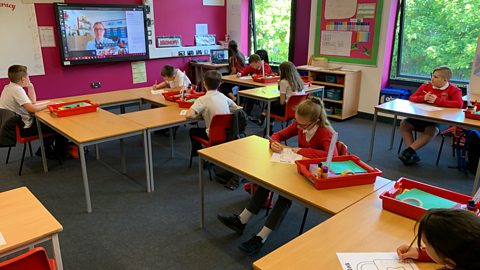
Bouncing back to school: Five ways to support children's wellbeing
Tips on helping children to deal with unusual times

Teacher Support Articles. collection
All our articles for teachers in one place, sharing peer-to-peer advice and personal experiences.
